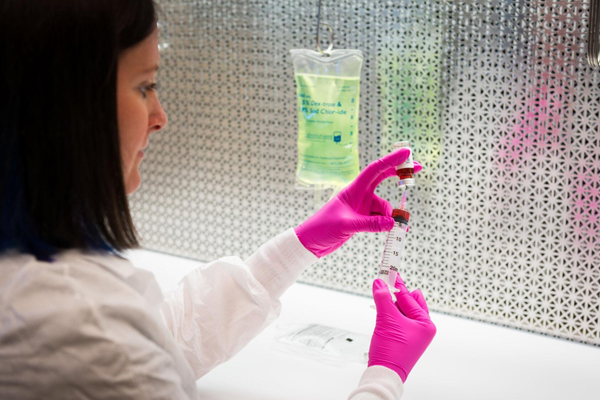Pharmacy technician program is a fast path to a career
COCC’s one-year program offers the only accredited training east of the Cascades in Oregon.
By Mark Russell Johnson - Jul 1, 2021
Things are looking particularly healthy in the field of pharmaceuticals. That’s in large part due to the number of baby boomers — individuals born between 1946 and 1964 —who are reaching older age in an era of advanced medical technology. By 2030, boomers are expected to double the country’s senior population to 70 million. As the drug industry surges to treat realities that come with senior living, such as chronic disease, the need for support services has grown too — including the role of pharmacy technicians.
Integral to connecting patients with treatments, pharmacy technicians prepare and package medications, from drugs that battle cancer to those that punch out a persistent cold. They calculate prescriptions — mixing, measuring, weighing — and fill orders. Techs help map out medication plans to safely and effectively integrate different prescriptions. Lately, they’ve been an essential part of the country’s pandemic response, with many states permitting qualified techs to administer COVID-19 vaccinations.
“It’s a great way to be in the medical field but not have direct patient care all the time,” said Stephanie O’Bryan, director of Central Oregon Community College’s pharmacy technician program, now in its 13th year. “It’s a good living, and you can go anywhere in the United States,” she added, referring to the national certification achieved through the one-year program, the only accredited training east of the Cascades in Oregon.
Currently capped at 20 students, the program launches a new cohort each fall. The coursework is offered in a hybrid and online format to better serve remote students.
“All the classes are taught online so they can be completed anywhere,” explained Wendi Worthington, COCC’s Health Careers outreach and recruitment coordinator. Students come to the Bend campus once a month during fall and winter terms for labs, she added, with hands-on learning happening over three days.
Come spring term, students are ready to embark on two practicums where they apply their skills in industry settings, typically in their own community: a combination of 120 hours in a retail pharmacy setting and 120 hours in an institutional pharmacy setting. They also do a brief stint with PacificSource Health Plans, for an insurance perspective, as well as with a compounding pharmacy and a home infusion pharmacy. By the end of the school year, graduates of the program are workforce-ready.
“We got the chance to get some real-life experience in two different pharmacy settings, retail and hospital,” said Troy Gallagher of Bend, whose many years in the construction industry had taken a physical toll and led him to seek out a career move. “Getting to experience what I would be doing as a pharmacy technician was invaluable and showed me the variety of options out there for certified pharmacy technicians.” Gallagher, who graduates this month, has already received a job offer.
The state of Oregon ranks fifth in the nation in average hourly wage — at $20.87 — for pharmacy technicians, according to recent data from the U.S. Department of Labor. O’Bryan explained that a number of regional employers are routinely in contact for new hires. “So many pharmacies are reaching out right now — more than ever — and some of them are even offering signing bonuses,” she said.
“There are so many ways you can go into it,” O’Bryan added. “So if you’re more of a people person you can work in a retail setting, and if you like mixing IVs and helping patients get better you might like a hospital. Or, if you just want to be on the telephone and talk to patients, insurance might be the way to go. There are so many opportunities and different avenues you can go down.”
That’s part of the reason recent graduate Cassie Vega chose the career path. “My husband’s aunt is a pharmacy tech and she has never had a problem finding a job, so when I looked into the program I figured this might be a good career choice,” she said. “I’ve also always wanted to work in health care.”
Vega, who has been with PacificSource Health Plans since last July, sees a reward in “just being able to call a patient and hear how our medications are helping them.”
Each state has different laws when it comes to working as a pharmacy tech. When students first begin the COCC program, they receive their Oregon Board of Pharmacy’s technician license. It lasts two years and allows them to work in Oregon. At the end of the program, they sit for their national exam and, with a passing score, can go to any state with their certification to seek employment; some states require additional licensing.
“It’s an excellent career for students wanting to make a change or who want to get started in the world of health care,” said Worthington, who leads one-hour discovery sessions for this and other COCC health care programs throughout the year. Upcoming sessions are on July 6 and July 20, both at 5:30 p.m.
For more details on the pharmacy technician program, visit cocc.edu or call 541-383-7700.

